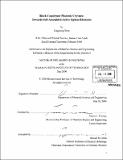| dc.contributor.advisor | Edwin L. Thomas. | en_US |
| dc.contributor.author | Yoon, Jongseung | en_US |
| dc.contributor.other | Massachusetts Institute of Technology. Dept. of Materials Science and Engineering. | en_US |
| dc.date.accessioned | 2007-02-21T18:45:35Z | |
| dc.date.available | 2007-02-21T18:45:35Z | |
| dc.date.copyright | 2006 | en_US |
| dc.date.issued | 2006 | en_US |
| dc.identifier.uri | http://hdl.handle.net/1721.1/36320 | |
| dc.description | Thesis (Ph. D.)--Massachusetts Institute of Technology, Dept. of Materials Science and Engineering, 2006. | en_US |
| dc.description | Includes bibliographical references. | en_US |
| dc.description.abstract | Block copolymers have proven to be a unique materials platform for easily fabricated large-area photonic crystals. While the basic concept of block copolymer based photonic band gap materials has been well demonstrated, little work has been achieved yet in terms of realizing optically active devices using these materials. [n this thesis, the utilization of block copolymer photonic crystals for creating self-assembled active optical elements has been experimentally explored with a special emphasis on optically driven lasing and stimulus responsive tunable reflectors. In pursuing these primary objectives, control of thin film microdomain orientation and novel three-dimensional (3D) optical characterization of block copolymer photonic crystals have been also achieved, both of which can greatly help optimize the properties of block copolymer photonic crystals. First, a laser cavity using block copolymer based one-dimensional (1D) photonic crystals has been demonstrated. Optically pumped surface-emitting lasing has been obtained using a dye-doped polymers as the organic gain medium and the self-assembled block copolymer as the spectral-band selective distributed Bragg reflector feedback element. | en_US |
| dc.description.abstract | (cont.) We also developed a novel organic/inorganic hybrid photonic crystal containing a dye-doped defect layer for defect-mode photonic bandgap lasing. Low threshold lasing has been demonstrated at a single defect-mode wavelength of the D photonic bandgap structure resulting from the inhibited density of states of photons within the stop band and the enhanced rates of spontaneous emission at the localized resonant defect mode. Second, stimulus responsive tunable self-assembled reflectors based on D block copolymer photonic crystals have been studied. Three external stimuli such as solvent, temperature, and compressive mechanical strain have been employed to modulate microstructural and material properties of block copolymer photonic crystals, resulting in effective tuning of the spectral characteristics of block copolymer photonic structures. Finally, control of the microdomain orientation of ID and 2D block copolymer photonic crystals has been achieved over a large area via directional solidification of solvent. Moreover, an intriguing ordering behavior of these ultrahigh molecular weight block copolymers has been revealed, which is dramatically different from that of typical molecular weight block copolymers. These highly oriented thin film microdomain patterns have been explored via 3D optical imaging using laser scanning confocal microscopy. | en_US |
| dc.description.statementofresponsibility | by Jongseung Yoon. | en_US |
| dc.format.extent | 184 leaves | en_US |
| dc.language.iso | eng | en_US |
| dc.publisher | Massachusetts Institute of Technology | en_US |
| dc.rights | M.I.T. theses are protected by copyright. They may be viewed from this source for any purpose, but reproduction or distribution in any format is prohibited without written permission. See provided URL for inquiries about permission. | en_US |
| dc.rights.uri | http://dspace.mit.edu/handle/1721.1/7582 | |
| dc.subject | Materials Science and Engineering. | en_US |
| dc.title | Block copolymer photonic crystals : towards self-assembled active optical elements | en_US |
| dc.type | Thesis | en_US |
| dc.description.degree | Ph.D. | en_US |
| dc.contributor.department | Massachusetts Institute of Technology. Department of Materials Science and Engineering | |
| dc.identifier.oclc | 76904706 | en_US |
